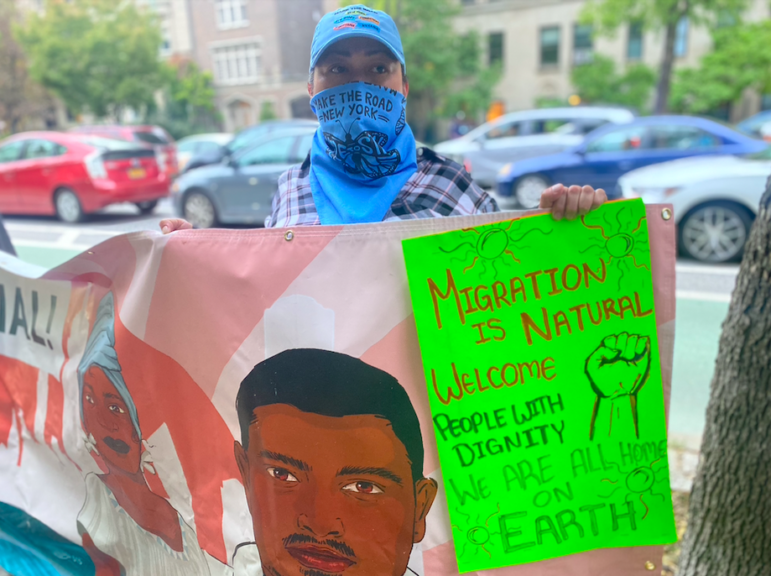‘Businesses across the state and nation are experiencing a significant labor shortage. The key to solving this crisis rests largely in our ability to maximize the untapped potential of our most vulnerable and disadvantaged residents. That starts by offering thousands of undocumented individuals, many of whom are holding essential jobs that keep our city running, a pathway to citizenship.’

Make the Road New York
Activists with Make the Road New York rally outside Sen. Schumer’s house on Oct. 5, 2021, calling for a pathway to citizenship.The future economic, cultural, and political success of New York City rests in the hands of its increasingly diverse population. This growth is critical to keep in mind as we grapple with the widespread labor shortages in key industries that were exacerbated by the pandemic and continue to threaten recovery efforts.
As president and CEO of the New York Women’s Chamber of Commerce, I’ve dedicated my career to empowering and fostering the economic development of women and minorities. Over the past 20 years, this organization has provided business services and training to more than 25,000 individuals and assisted with the creation of more than 15,000 new businesses.
As a native of the Dominican Republic, I know firsthand the barriers to success faced by many immigrants and people of color. I’ve also witnessed all the livelihoods impacted by the COVID-19 crisis, which disproportionately affected the Latino community—both physically and financially.
Businesses across the state and nation are experiencing a significant labor shortage. The key to solving this crisis rests largely in our ability to maximize the untapped potential of our most vulnerable and disadvantaged residents. That starts by offering thousands of undocumented individuals, many of whom are holding essential jobs that keep our city running, a pathway to citizenship.
 CityViews are readers’ opinions, not those of City Limits. Add your voice today!
CityViews are readers’ opinions, not those of City Limits. Add your voice today!
Women, especially women of color, were struggling even prior to the pandemic to balance the dual demands of their jobs and families, and are now finding it more difficult to re-enter the workforce. Also of concern are the setbacks experienced by self-employed small business owners, many of whom have closed their doors for good, though there has been an encouraging uptick in entrepreneurship.
We must invest in programs that improve public health, provide training, education, childcare, and other services so people across all walks of life can realize their dreams and goals. And Congressional leaders must recognize the once-in-a-generation opportunity now before them to pass immigration reform so those who have long contributed to society but remain in a legal limbo can adjust their status to reach their full potential.
Antiquated immigration policies affect a large portion of New York’s population—both citizens and undocumented—with 630,000 U.S. adults and children living with undocumented immigrants. Further, an estimated 226,000 U.S. citizen children living with at least one undocumented parent. Outside of the household, a significant number of undocumented immigrants are working, starting businesses, and contributing billions to the economy. New York alone is home to more than 280,000 immigrant entrepreneurs, including 53,000 undocumented entrepreneurs.
Throughout the pandemic, an estimated 330,000 undocumented workers have toiled in essential industries while contributing billions in annual taxes and housing payments. A lack of legislation that allows immigrants to adjust their status to become U.S. citizens is morally wrong and jeopardizes both our future workforce and economic growth.
While initiatives like the Deferred Action for Childhood Arrivals (DACA) program provide qualified young undocumented immigrants, or Dreamers, with temporary deportation protections so they can live, work, and go to school in the only place they’ve ever known as home, it doesn’t extend to all Dreamers, is temporary, and under threat.
The Department of Homeland Security has announced efforts to strengthen the DACA program following a federal judge’s ruling in Texas that prevents new DACA applications from being processed, but this remains a potential stopgap for the only real solution—congressional action.
Thankfully, there are several avenues available to pass immigration reform to allow for undocumented immigrants to adjust their status. With a majority of American voters in support of doing just that and negotiations on Capitol Hill intensifying, I hope Congress gets this done.
The Senate parliamentarian’s initial rejection of Democrats’ efforts to include immigration reform in the budget package was disappointing. U.S. Senate Majority Leader Chuck Schumer and his fellow congressional leaders, along with the Biden administration, cannot be deterred, and must continue their efforts to deliver on long-standing promises to let eligible undocumented individuals apply for permanent legal residency and eventually obtain full citizenship.
Immigration reform is a common-sense solution that will positively impact the lives of hundreds of thousands of people while securing our collective economic future. Creating a pathway to citizenship is not only the right thing to do, it will also help to fill thousands of good-paying jobs and set us on the path to long-term success.
Quenia Abreu is the president and CEO of the New York Women’s Chamber of Commerce.








